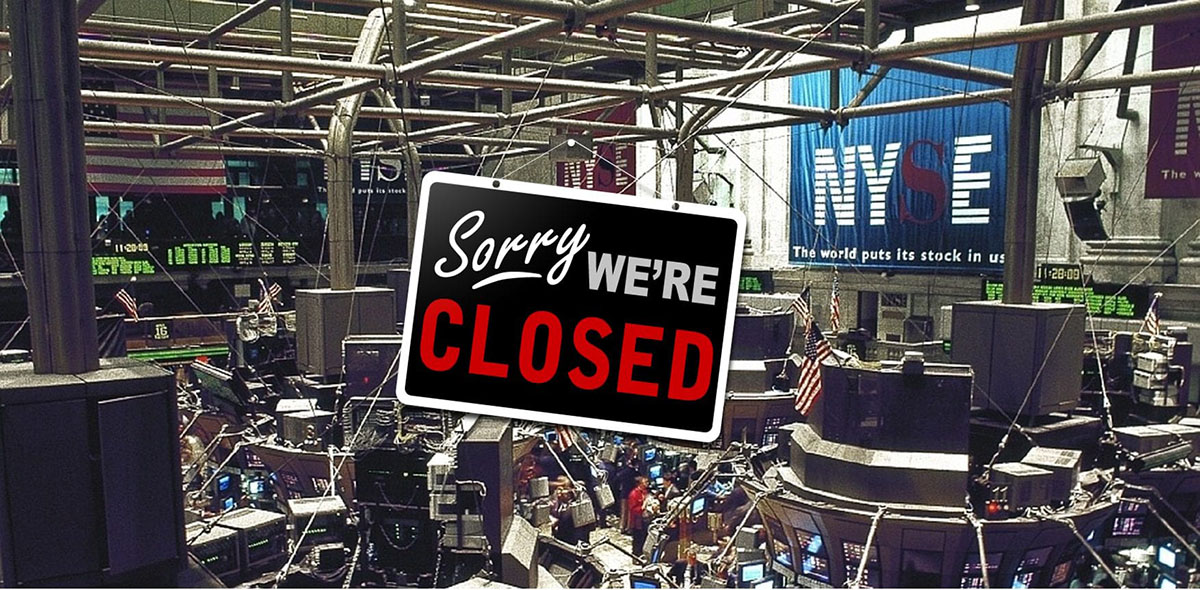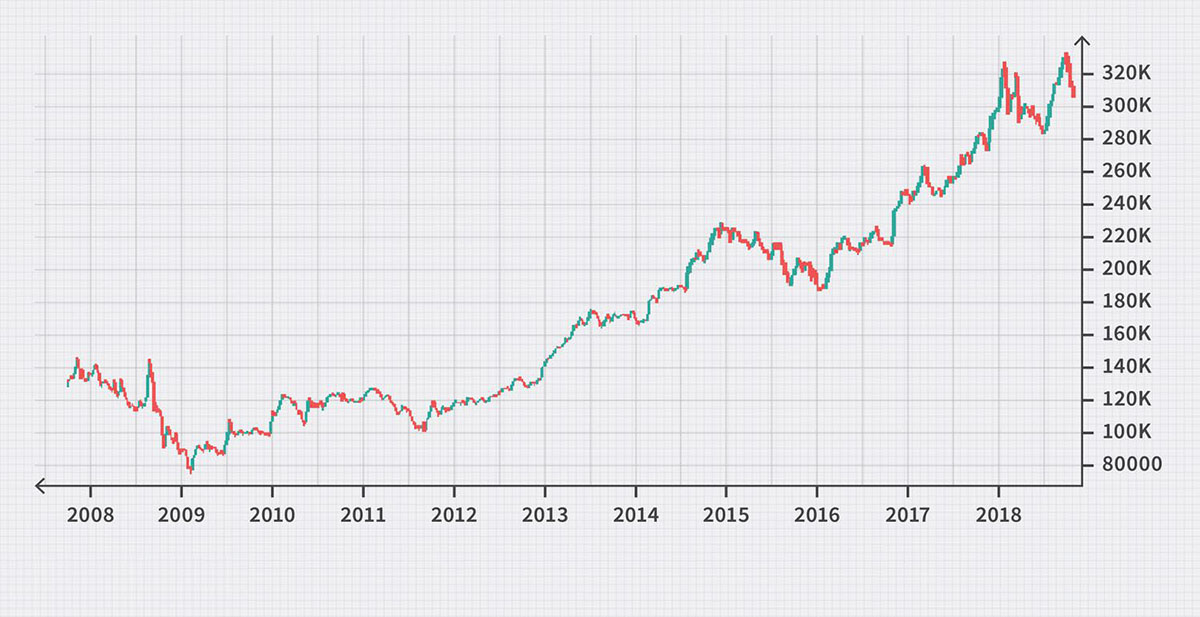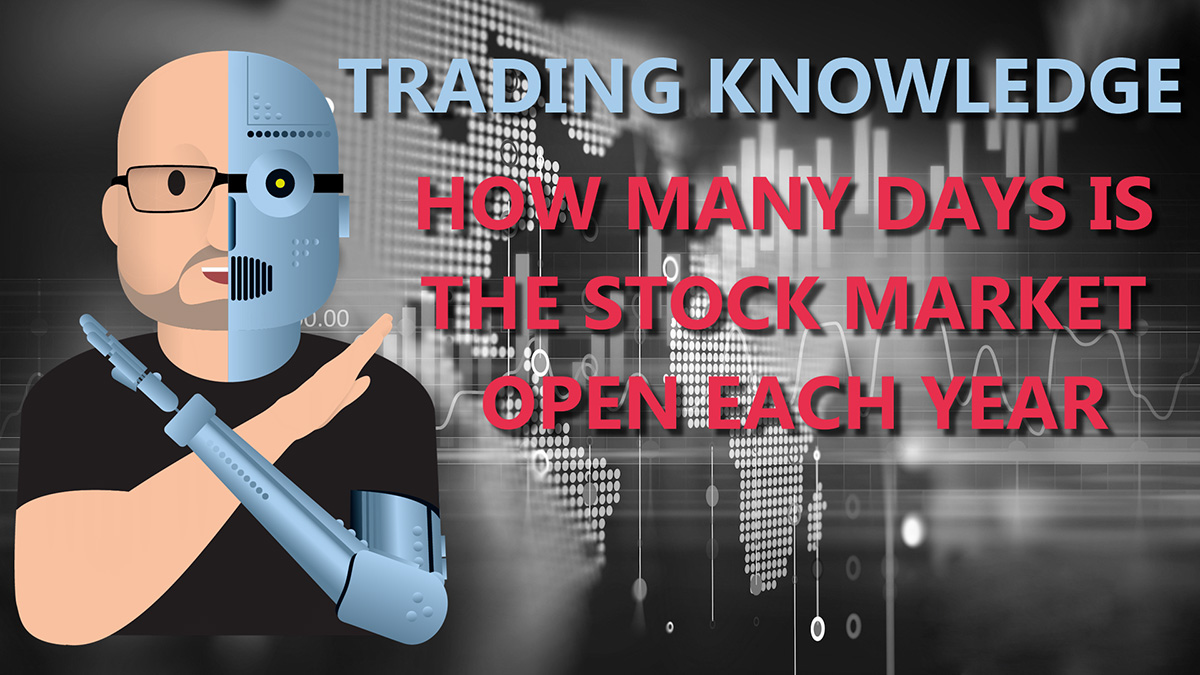

Finance
What Days Are The Stock Market Closed In 2017
Published: November 3, 2023
Discover the stock market closing dates for 2017. Plan your financial activities accordingly. Stay informed about trading holidays and make the most of your investments.
(Many of the links in this article redirect to a specific reviewed product. Your purchase of these products through affiliate links helps to generate commission for LiveWell, at no extra cost. Learn more)
Table of Contents
Introduction
One important aspect of investing in the stock market is understanding the trading schedule and knowing when the market is closed. As an investor, it is crucial to be aware of the holidays and observances that result in the closure of the stock market. This knowledge allows you to plan your investment activities and make informed decisions accordingly.
In 2017, the stock market operated on its regular schedule for the majority of the year. However, there were several days when the market was closed due to various holidays. These closures present opportunities for investors to take a break, reflect on their investment strategy, and prepare for the next trading session. It is important to note that while the stock market is closed on these holidays, other financial markets may still be open, and electronic trading platforms may still be available for limited trading.
In this article, we will explore the key holidays and observances that resulted in the closure of the stock market during the year 2017. We will provide details on each holiday and its significance, allowing you to better understand the factors influencing the closure and plan your investment activities accordingly. Let’s delve into the important dates and events that affected the trading schedule in 2017.
New Year’s Holiday
The New Year’s holiday is one of the major holidays that results in the closure of the stock market. In 2017, the New Year’s holiday fell on Sunday, January 1st. As a result, the stock market was closed on Monday, January 2nd, in observance of the holiday.
New Year’s Day is a time of celebration and reflection as we bid farewell to the previous year and welcome the new one. It marks the beginning of a fresh start and is often associated with setting new goals and resolutions. Many people take this time to relax and spend time with loved ones, and the stock market closure allows investors to pause and evaluate their investments without the pressure of trading.
It is important to note that even though the stock market is closed on New Year’s Day, stock exchanges worldwide may still be open for trading. Additionally, electronic trading platforms may offer limited trading during this time. As an investor, it is essential to stay informed about the availability of these alternative trading options if you wish to execute transactions.
If you plan on making any investment decisions around the New Year, it is advisable to do your research and be prepared to execute your trades before or after the market closure. This way, you can take advantage of potential market movements and position yourself strategically for the upcoming year.
Martin Luther King Jr. Day
Martin Luther King Jr. Day is an annual federal holiday in the United States that commemorates the life and achievements of civil rights leader Martin Luther King Jr. The holiday is observed on the third Monday of January each year. In 2017, Martin Luther King Jr. Day fell on Monday, January 16th, resulting in the closure of the stock market.
Martin Luther King Jr. was an influential figure in the American civil rights movement, advocating for equality and justice through peaceful protests and nonviolent resistance. This holiday not only honors his legacy but also serves as a reminder of the continued struggle for equality and social justice.
The closure of the stock market on Martin Luther King Jr. Day provides investors with an opportunity to reflect on his contributions and the values he stood for. It is a time to appreciate the progress made in civil rights and to consider how these societal changes can impact the business and investment landscape.
While the stock market is closed, it is important to note that other financial markets, such as bond markets and commodity markets, may still be open for trading. Additionally, electronic trading platforms may offer limited trading options for certain securities. Investors should be aware of these alternatives if they wish to make investment decisions on this day.
Observing Martin Luther King Jr. Day is not only a time to remember and honor a great leader but also an opportunity to reflect on the values and principles that guide our society. Whether you choose to spend the day with loved ones or engage in activities promoting equality and justice, taking a break from the stock market can provide a valuable perspective on the larger issues affecting our world.
Presidents Day
Presidents Day is a federal holiday in the United States that is observed on the third Monday of February. The holiday is intended to honor and celebrate the contributions and achievements of past presidents of the United States. In 2017, Presidents Day fell on Monday, February 20th, resulting in the closure of the stock market.
This holiday provides an opportunity for Americans to reflect on the legacy of the nation’s leaders and the impact they have had on shaping the country. It is a time to appreciate the leadership qualities and decisions that have shaped the course of history.
The closure of the stock market on Presidents Day allows investors to take a step back and consider the broader context in which their investments operate. It is a chance to reflect on the policies and actions of past presidents and how they may influence the economy and financial markets.
While the stock market is closed on Presidents Day, it is important to note that other financial markets, such as the bond market, may still be open for trading. Additionally, electronic trading platforms may offer limited trading options. If you are actively managing your investments, it is essential to be aware of these alternatives.
Presidents Day is not only a time to honor the leaders of the past but also an opportunity to reflect on the qualities and values that make for effective leadership. Whether you engage in historical research, participate in community events, or spend time with loved ones, taking a break from the stock market can allow for a deeper appreciation of the role of leadership in both our nation and our investments.
Good Friday
Good Friday is a significant religious holiday that commemorates the crucifixion of Jesus Christ and his death at Calvary. It is observed by Christians worldwide, and in some countries, it is recognized as a public holiday. In 2017, Good Friday fell on April 14th, and as a result, the stock market was closed on that day.
For many Christians, Good Friday is a solemn and reflective day. It is a time to contemplate the sacrifice made by Jesus and the significance of his death in Christian teachings. The closure of the stock market on Good Friday allows believers to devote their time to religious observances and participate in worship services.
While the stock market is closed, it is important to note that electronic trading platforms may still be available for limited trading. Additionally, other financial markets, such as the bond market, may have adjusted trading hours. Investors should be aware of these alternatives if they wish to actively manage their investments during this time.
Good Friday presents an opportunity for investors to take a break from the fast-paced nature of the stock market and reflect on their investment strategies. It allows for a period of introspection and evaluation of long-term financial goals. Whether you choose to spend the day in prayer and reflection or engage in charitable activities, Good Friday provides a meaningful pause in the trading calendar.
It is important to consider the cultural and religious significance of Good Friday, even if you do not personally observe the holiday. Being mindful of the diverse beliefs and practices of different cultures and religions adds a layer of empathy and understanding to your investment approach. By acknowledging and respecting these observances, you foster a more inclusive and informed investment strategy.
Memorial Day
Memorial Day is a federal holiday in the United States that is observed on the last Monday of May. It is a day dedicated to honoring and remembering the men and women who have died while serving in the United States Armed Forces. In 2017, Memorial Day fell on May 29th, resulting in the closure of the stock market.
This holiday holds significant importance as it allows Americans to express gratitude and pay respect to those who made the ultimate sacrifice to protect the freedoms we enjoy. It is a time to remember the bravery and selflessness of the fallen soldiers and reflect on the price of freedom.
The closure of the stock market on Memorial Day provides an opportunity for investors to pause and remember the values and principles that make our nation strong. It is a time to reflect on the impact of military actions on the global economy and consider the geopolitical factors that can influence investments.
While the stock market is closed on Memorial Day, it is important to recognize that other financial markets, such as the bond market, may still be open for trading. Additionally, electronic trading platforms may offer limited trading options. If you are actively managing your investments, it is crucial to be aware of these alternatives.
Memorial Day is not only a time to honor fallen heroes but also an opportunity to appreciate the sacrifices of military families and veterans. Whether you participate in memorial ceremonies, visit national cemeteries, or engage in charitable acts, taking a break from the stock market on this day allows for collective remembrance and gratitude.
As an investor, it is also essential to consider the impact of military activities and geopolitical events on the financial markets. Understanding the interconnectedness between global conflicts and investments can help you make informed decisions and navigate market volatility more effectively.
Independence Day
Independence Day, also known as the Fourth of July, is a federal holiday in the United States that commemorates the Declaration of Independence and the birth of the nation. It is a time for Americans to come together to celebrate freedom, patriotism, and independence. In 2017, Independence Day fell on Tuesday, July 4th, resulting in the closure of the stock market.
Independence Day holds a special place in American history and culture. It is a day of parades, fireworks, barbecues, and family gatherings. Americans take pride in the freedoms and liberties guaranteed by the Constitution, and this holiday serves as a reminder of the sacrifices made by our founding fathers to secure these rights.
The closure of the stock market on Independence Day allows investors to join in the festivities and celebration of the nation. It provides an opportunity to reflect on the values and principles that underpin the American economy and how they contribute to financial markets.
While the stock market is closed on Independence Day, it is important to note that other financial markets, such as the bond market, may have adjusted trading hours. Additionally, electronic trading platforms may offer limited trading options. Investors should be aware of these alternatives if they wish to make investment decisions on this day.
Independence Day is not only a time to enjoy the festivities but also an opportunity to reflect on the resilience and ingenuity of the American people. Whether you participate in parades, watch fireworks displays, or engage in community service, taking a break from the stock market on Independence Day allows for a deeper appreciation of the shared values and aspirations that drive the economy.
As an investor, it is important to recognize the impact of national holidays and cultural celebrations on the financial markets. Being mindful of these events and their significance can help you better understand market trends and make more informed investment decisions.
Labor Day
Labor Day is a federal holiday in the United States that is observed on the first Monday of September. It is a day dedicated to honoring the contributions and achievements of American workers and the labor movement. In 2017, Labor Day fell on September 4th, resulting in the closure of the stock market.
Labor Day serves as a reminder of the importance of the labor force in building and sustaining the nation’s economy. It is a time to recognize the hard work, dedication, and resilience of workers across various industries. The holiday originated in the late 19th century as a way to acknowledge the labor movement’s advocacy for better working conditions and fair wages.
The closure of the stock market on Labor Day provides investors with an opportunity to reflect on the role of labor in the economy and the impact it has on the financial markets. It allows for a pause in trading activities and a chance to consider the relationships between labor trends, market dynamics, and investment opportunities.
While the stock market is closed on Labor Day, it is important to note that other financial markets, such as the bond market, may still be open for trading. Additionally, electronic trading platforms may offer limited trading options. Investors should be aware of these alternatives if they wish to engage in investment activities on this day.
Labor Day is not only a time to relax and enjoy the long weekend but also an opportunity to express gratitude for the contributions of the labor force. Whether you spend the day with family and friends, engage in recreational activities, or participate in community events, taking a break from the stock market on Labor Day allows you to appreciate the efforts and achievements of workers in shaping the economic landscape.
As an investor, it is important to keep an eye on labor market trends and their potential impact on different sectors of the economy. Understanding the dynamics of the labor market, such as unemployment rates, wage growth, and workforce participation, can help inform investment decisions and identify potential opportunities.
Thanksgiving Day
Thanksgiving Day is a national holiday celebrated in the United States on the fourth Thursday of November. It is a time for expressing gratitude, gathering with loved ones, and enjoying a delicious feast. In 2017, Thanksgiving Day fell on November 23rd, resulting in the closure of the stock market.
Thanksgiving has a rich history rooted in the tradition of giving thanks for a plentiful harvest and the blessings received throughout the year. It is a day to appreciate the abundance in our lives and express gratitude for the relationships and opportunities that enrich us.
The closure of the stock market on Thanksgiving Day allows investors to take a break from the fast-paced world of trading and focus on the true meaning of the holiday. It provides a chance to spend time with family and friends, partake in festive traditions, and reflect on the importance of gratitude and togetherness.
While the stock market is closed on Thanksgiving Day, it is important to note that electronic trading platforms may offer limited trading options, particularly for global markets. Additionally, other financial markets may have adjusted trading hours. Investors who wish to engage in trading activities during this time should be aware of these alternatives.
Thanksgiving Day is not only a time for feasting and gathering, but also an opportunity to nurture a mindset of gratitude and appreciation. Whether you participate in volunteer work, engage in acts of kindness, or simply take the day to reflect on the blessings in your life, taking a break from the stock market on Thanksgiving Day can remind you of the importance of non-material factors in our journey as investors.
As an investor, it is important to remember that market trends and financial opportunities are not the only aspects that contribute to a fulfilling life. Balancing your investment goals with personal values and relationships is vital for long-term success and happiness.
Christmas Day
Christmas Day is a widely celebrated holiday that marks the birth of Jesus Christ and is observed by Christians around the world. In the United States, it is a federal holiday and is recognized on December 25th each year. The stock market is closed on Christmas Day, allowing investors to take a break and celebrate the joyous occasion.
Christmas is a time of love, joy, and giving. Families and friends come together to exchange gifts, share meals, and create lasting memories. The holiday season provides an opportunity to appreciate the spirit of generosity and kindness, and to reflect on the values that bring us closer as a community.
The closure of the stock market on Christmas Day allows investors to step away from the market fluctuations and focus on the festivities. It gives them a chance to relax, unwind, and spend quality time with loved ones. This break can be rejuvenating and offer a fresh perspective as investors contemplate their financial goals for the upcoming year.
While the stock market is closed on Christmas Day, it is important to note that other financial markets may have adjusted trading hours. Additionally, electronic trading platforms may offer limited trading options for certain securities. Investors should be aware of these alternatives if they wish to make investment decisions during this time.
Christmas Day is not only a time for gift-giving and celebration, but also a time for reflection and gratitude. Whether you attend religious services, engage in acts of charity, or participate in festive activities, taking a break from the stock market on Christmas Day allows you to focus on the joy of the season and the importance of giving back to others.
As an investor, it is essential to recognize the larger values that drive our decisions and investments. By nurturing strong personal relationships, practicing generosity, and embracing the true meaning of Christmas, you can create a more balanced and fulfilling approach to your financial endeavors.
Conclusion
Understanding the days when the stock market is closed is essential for investors to effectively plan their investment activities. Throughout the year, there are holidays and observances that result in the closure of the stock market. These holidays provide investors with an opportunity to take a step back, reflect, and appreciate the significance of these occasions.
In 2017, several holidays resulted in the closure of the stock market. From New Year’s Day and Martin Luther King Jr. Day in January to Thanksgiving Day and Christmas Day in November and December, each holiday holds its own importance and offers a break from the stress of trading.
Taking a break from the stock market on these holidays allows investors to focus on other aspects of their lives. Whether it’s spending time with loved ones, participating in community events, or engaging in personal reflection, these moments of relaxation and connection can have a positive impact on overall well-being and investment mindset.
It’s important to note that while the stock market is closed on these holidays, other financial markets and electronic trading platforms may still offer limited trading options. Being aware of these alternatives can help investors stay informed and make strategic decisions if they choose to engage in trading activities during these closures.
By understanding the significance of holidays and observances, investors can also gain insight into societal and cultural factors that may impact financial markets. Whether it’s recognizing the impact of labor movements on Labor Day or considering the global implications of geopolitical events on Independence Day, understanding these dynamics can inform investment decisions.
In conclusion, being aware of the days when the stock market is closed and taking advantage of these holidays for personal growth and reflection can be a valuable approach for investors. By finding a balance between actively managing investments and enjoying moments of rest and appreciation, investors can cultivate a more holistic and fulfilling approach to their financial journey.














